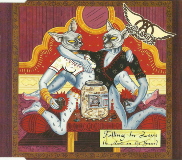This article needs additional citations for verification .(February 2012) |
| "Falling in Love (Is Hard on the Knees)" | ||||
|---|---|---|---|---|
 | ||||
| Single by Aerosmith | ||||
| from the album Nine Lives | ||||
| B-side | "Fall Together" | |||
| Released | February 11, 1997 | |||
| Length | 3:26 | |||
| Label | Columbia | |||
| Songwriter(s) | ||||
| Producer(s) | Kevin Shirley | |||
| Aerosmith singles chronology | ||||
| ||||
| Music video | ||||
| "Falling in Love (Is Hard on the Knees)" on YouTube | ||||
"Falling in Love (Is Hard on the Knees)" is a song by American hard rock band Aerosmith that appeared on the band's 12th studio album, Nine Lives (1997). The song was written by Steven Tyler, Joe Perry, and Glen Ballard, who had signed on to produce Nine Lives. Although he was dropped from the role halfway through production and replaced by Kevin Shirley, Ballard was still credited for his contributions to the album; he also co-wrote "Pink" with Tyler and Perry and "Taste of India" with Tyler and Richard Supa.
Contents
- Chart performance
- Music video
- Track listings
- Charts
- Weekly charts
- Year-end charts
- Certifications
- Release history
- References
Released as a single on February 11, 1997, the song topped the Spanish Singles Chart and reached number two in Canada for four weeks. It also topped the UK Rock Chart and the US Billboard Mainstream Rock chart. Elsewhere, the track peaked at number four in the Czech Republic while reaching the top 10 in Finland and the top 30 in Iceland, Sweden, Switzerland, and the United Kingdom. On the US Billboard Hot 100, it reached number 35.